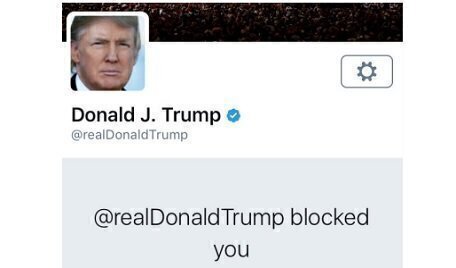As promised, a First Amendment group has filed suit in federal court on behalf of a group of Twitter users who were offended after they were blocked by Trump or his surrogates from following the President’s social media account.
 On Tuesday, the Knight First Amendment Institute at Columbia University filed its lawsuit on behalf of seven plaintiffs in the United States District Court For The Southern District Of New York. The defendants are President Donald Trump, White House Press Secretary Sean M. Spicer and White House Social Media Director Daniel Scavino.
On Tuesday, the Knight First Amendment Institute at Columbia University filed its lawsuit on behalf of seven plaintiffs in the United States District Court For The Southern District Of New York. The defendants are President Donald Trump, White House Press Secretary Sean M. Spicer and White House Social Media Director Daniel Scavino.
The Institute wants the Trump team to immediately restore the plaintiff’s access to Trump’s account, so they can comment on Trump’s Twitter messages. “Plaintiffs respectfully ask that the Court declare that the viewpoint-based exclusion of the individual Plaintiffs violates the First Amendment, and order the Defendants to restore their access,” the suit says.
The 25-page lawsuit shows illustrated examples of Trump’s Twitter statements, along with messages that appear when a Twitter user is blocked from the account.
The Institute’s legal team also contends that recent Supreme Court comments along with Trump statements not only support the legitimacy of Twitter but also its status as an official communications platform of the President as an elected official.
The attorneys cite Packingham v. North Carolina, a recently decided Supreme Court decision where Justice Anthony Kennedy said that digital platforms “can provide perhaps the most powerful mechanisms available to a private citizen to make his or her voice heard. They allow a person with an Internet connection to ‘become a town crier with a voice that resonates farther than it could from any soapbox.’”
Recently, President Trump and his representatives have said that Twitter statements represented presidential statements. “My use of social media is not Presidential – it’s MODERN DAY PRESIDENTIAL,” Trump said on Twitter in early July, for example.
The Institute says the “Plaintiffs are Twitter users who have been blocked by one or more of the Defendants from the @realDonaldTrump account because they criticized the President or his policies.” In one example, a user was blocked after claiming Russia helped the Trump campaign win the 2016 presidential election. Another user was allegedly blocked after criticizing President Trump’s well-noted “covfefe” Tweet. “Covfefe: The same guy who doesn’t proofread his Twitter handles the nuclear button,” wrote plaintiff Brandon Neely.
The plaintiffs allege several First Amendment violations: the Twitter blocking imposes viewpoint-based restriction on their participation in a public forum, a restriction their access to official presidential statements, and a restriction on their ability to petition the government for redress of grievances.
In June, the Knight First Amendment Institute said it had planned to file suit in the case in the near future. “Though the architects of the Constitution surely didn’t contemplate presidential Twitter accounts, they understood that the President must not be allowed to banish views from public discourse simply because he finds them objectionable,” said Jameel Jaffer, the Institute’s executive director, in a statement at the time. “Having opened this forum to all comers, the President can’t exclude people from it merely because he dislikes what they’re saying.”
One argument sure to be made by the Justice Department is that Trump’s account in a personal Twitter account, and not subject to the limitations of a public figure speaking in a public forum. Not all experts see a strong argument supporting the Knight Institute’s case.
“There’s no right to free speech on Twitter. The only rule is that Twitter Inc. gets to decide who speaks and listens -- which is its right under the First Amendment. If Twitter wants to block Trump, it can. If Trump wants to block followers, he can,” said legal expert Noah Feldman on Bloomberg.com.
The idea of Twitter as a public forum, Feldman says, is a stretch. “The impulse to treat Twitter as a public forum is understandable. First Amendment students sometimes get their minds blown when they realize Facebook isn’t a public forum, either, but a privately controlled forum like Fox News or MSNBC,” he said.
Another professor, Eugene Volokh, argued in June that there could be an argument to support a lawsuit like the one filed on Tuesday and that the case supporting Trump isn’t as “open and shut” as it seems.
“The most constitutionally significant effect would be that blocked users apparently can’t post to Twitter comment threads, at least without some complicated workarounds,” he said. “If @RealDonaldTrump is seen as a governmental project and thus a limited public forum, then viewpoint-based exclusion from posting to such threads likely would be unconstitutional, just as viewpoint-based exclusion from commenting on a government-run Facebook page would be.”
Scott Bomboy is the editor in chief of the National Constitution Center.







